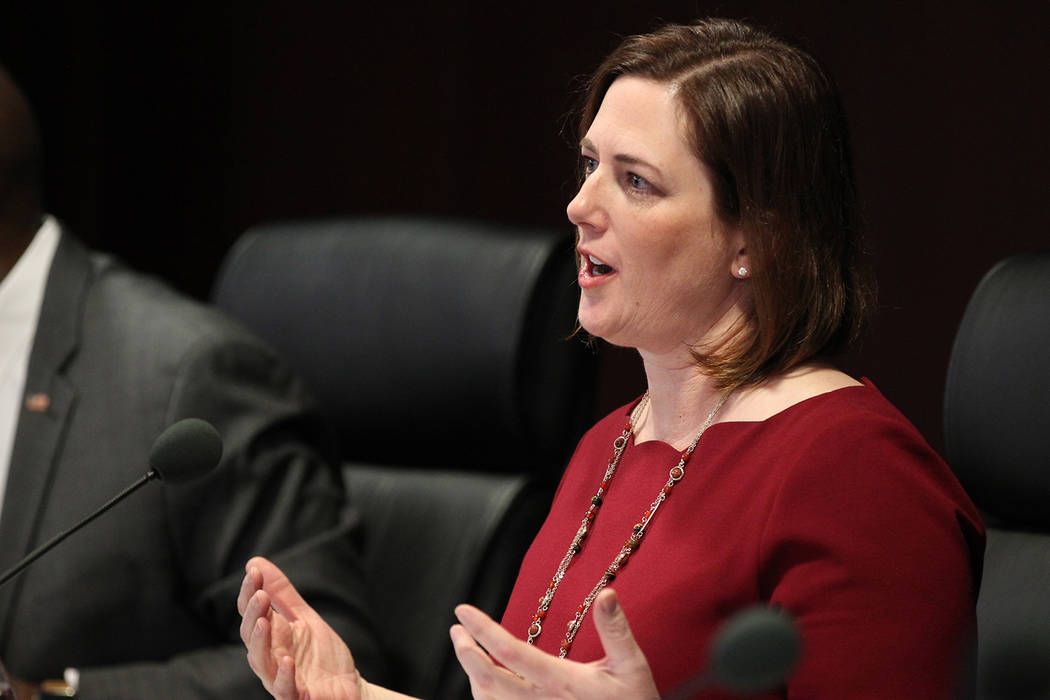Gaming Control Board discusses possible sexual harassment regulation
A sexual harassment discussion filled the state Gaming Control Board’s hearing room for only an hour Thursday.
Some were anticipating being there most of the afternoon, as regulators took their first step toward possibly requiring licensees to adopt and maintain a comprehensive written sexual harassment prevention plan.
Most in attendance were curious observers. But about a dozen people added comments ranging from their companies already having policies in place to questioning the need for a regulation at all, because sexual harassment guidelines already are overseen by the U.S. Equal Employment Opportunity Commission and the Nevada Equal Rights Commission.
“These regulations appear to be a knee-jerk response to media coverage of (sexual misconduct) allegations that have not been tested or proven by any court or agency,” attorney Jen Sarafina of the Kamer Zucker Abbott law firm in Las Vegas said at the hearing.
“This would add another duplicative and unnecessary layer of regulation in reporting by licensees which would result in a waste of governmental resources in monitoring that additional layer,” she said.
Inappropriate customers
But others said the regulations are essential. Representatives of the Culinary union testified that the guidelines could go even further to address how to respond to casino customers inappropriately touching employees.
The regulation would require an annual survey that would ask employees whether they are being harassed or know of any harassment taking place.
Virginia Valentine, president of the Nevada Resorts Association, said the survey is flawed as is.
“The question in the original draft is so broad that any employee’s grievance with the employer could lead to a negative answer,” she said. “I think the real issue is whether or not the employer has sufficiently publicized its policy and if the employees feel comfortable in reporting harassment.”
Wynn scandal
The proposal was spurred by the sexual harassment scandal that has rocked Wynn Resorts Ltd. and led to the resignation of its chairman and CEO, Steve Wynn, in February.
Wynn has denied all accusations that he sexually harassed or assaulted employees over the course of several decades, but he stepped down from his corporate role and sold all his shares of company stock. New Wynn Resorts CEO Matt Maddox has worked to separate Steve Wynn from the company as industry regulators in two states and Macau investigate allegations reported in several publications since late January.
Representatives of several gaming companies, including Wynn Resorts, attended the meeting but didn’t address the board.
More to come
It was the first of what could be several sessions on a proposed amendment to the state’s Regulation 5 on the operation of gaming establishments and businesses.
Thursday’s hearing was considered a public regulation workshop session with no votes scheduled to be taken. Control Board Chairwoman Becky Harris said she expects at least one more workshop meeting to be scheduled in Northern Nevada. Thursday’s session was teleconferenced to the board’s Carson City hearing room, but no one participated from there.
Harris explained that the draft proposal was a first step toward bringing the issue to the public and that there had been no prior discussion because of open-meeting-law restrictions. And other regulators have indicated there may be other ways to address the issue rather than to amend regulations.
While the Control Board can propose regulatory modifications, it’s up to the Nevada Gaming Commission to establish policy.
A previous version of this story misspelled the name of Jen Sarafina.
Contact Richard N. Velotta at rvelotta@reviewjournal.com or 702-477-3893. Follow @RickVelotta on Twitter.
Sexual Harassment Regulations Workshop Draft by Las Vegas Review-Journal on Scribd
Proposed regulation's highlights
Some of the highlights of the proposed amendment:
— Every licensee would be required to adopt and maintain "a comprehensive written plan addressing sexual harassment prevention in the licensee's workplace." The plan must include procedures for investigating a report of sexual harassment and list consequences for violators.
— Licensees must annually file a report verifying compliance and board investigators can inspect the plan or records at any time.
— Plans must include "an unequivocal statement that sexual harassment will not be tolerated and … that there is an organizational commitment to diversity, inclusion and respect."
— The plan must have an easy-to-understand description of prohibited conduct with examples.
— There are requirements for the identities of reporting individuals, witnesses to incidents and alleged perpetrators to be kept confidential.
— Licensees must designate an individual and an alternative person as points of contact on sexual harassment matters and alternative methods of reporting, such as an employee hotline, must be established.
— A requirement that a licensee must immediately conduct an impartial investigation of incidents and take immediate corrective action.
— All records of a sexual harassment claim must be retained for five years following the outcome or determination of an investigation and final disposition.























